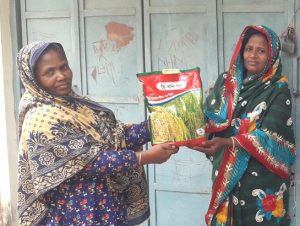Danielle Nierenberg
Food Tank has collected 20 of the best new books in food and agriculture to celebrate spring. Our favorite reads this season cover critical topics including the paradox of obesity and malnutrition, building strong communities through socially-conscious food systems, and the essential link between food and health. Travel from Italy to Puerto Rico and Australia and learn how people all over the world grow, harvest, sell, and eat food—and why it’s important to the future of this planet. Then, bring your new knowledge about food to the kitchen with various cookbooks and guides that will inspire environmentally-conscious, healthy, and creative cooking.
The days are getting longer and the air is getting warmer, so take advantage of the weather for reading outside and dig into the season’s best reads.1. Bread is Gold, Massimo Bottura
Michelin-Star Chef Massimo Bottura’s new cookbook takes a holistic look at food waste, focused on creating extraordinary meals from ordinary and sometimes overlooked ingredients. Committed to helping others eat and live well, Bottura’s cookbook presents over 150 recipes from 45 of the world’s top chefs creating inspiring dishes from everyday ingredients, encouraging readers to reduce home food waste.
2. Eat a Little Better: Great Flavor, Good Health, Better World, Sam Kass
In his new book, Sam Kass, the former White House Chef for the Obamas and the Senior White House Policy Advisor for Nutrition, shares his philosophy on food as well as practical solutions for making decisions in the kitchen that are good for nutritional health and the health of the environment. From shopping and organizing your kitchen, to cooking and reducing waste, Kass’ book provides a wealth of knowledge for the dedicated home cook and 90 simple recipes from his time cooking for the President.
3. The Faces of Local Food: Celebrating the People Who Feed Us, Charlotte Caldwell
In her latest book, Charlotte Caldwell provides readers with an intimate look into the lives of local producers supporting the food system. Through a collection of personal vignettes, readers can step out of the grocery store and into the shoes of the fishers, farmers, ranchers, chefs and many other food system contributors, and hear their stories. The Faces of Local Food paints a vivid picture of the meaningful contributors to the food system, and is a powerful reminder of the power of food to inform, transform, and bring people together.
4. Food from the Radical Center: Healing Our Land and Communities, Gary Paul Nabhan Forthcoming September 2018
Food from the Radical Center is a message of hope in the face of very challenging political and economic realities in the United States. Nabhan presents food production as a unique opportunity to unite estranged communities divided by political ideologies. Through stories from around the country, Nabhan illustrates his belief that “the restoration of land and rare species has provided—dollar for dollar—one of the best returns on investment of any conservation initiative.”
5. Food Is the Solution: What to Eat to Save the World, Matthew Prescott
Prescott’s cookbook features an eclectic collection of infographics, photographs, essays, and over 80 recipes that help protect the planet. Featuring original essays from James Cameron, Jesse Eisenberg, Chef José Andrés, and many more, this book is full of recipes and ideas that are good to eat and good for the earth.
6. The Fruit Forager’s Companion, Sara Bir Forthcoming May 25, 2018
The Fruit Forager’s Companion is a how-to-guide covering foraging, gathering, and preservation techniques. Seasoned chef, forager and gardener Sarah Bir believes foraging is a “small act of civil disobedience” and encourages readers to look outside their front door to find unexpected ingredients for over 100 recipes, spanning from familiar fruits to less known treasures.
7. Fruitful Labor: Deep Ecology of a Small Farm, Mike Madison
Dive into the life of Mike Madison on his small farm in the Sacramento Valley of California. Experienced farmers and eaters alike will relate to Madison’s story as he describes the ecology of his land, the agroecological challenges he faces, and his personal understanding of sustainability. This book is a wonderful glimpse at local food production within the complexity of the larger food system.
8. How to Feed the World, Jessica Eise (editor) and Ken Foster (editor)
Eise and Foster tackle the pressing question of how to feed the 10 billion people projected to be living on the earth by 2050. Bringing together experts from various sectors of the global food system How to Feed the World provides a foundational look at the modern food system, diving deep into the issues surrounding food and agriculture and presenting information in these complex questions in a way accessible for all readers. The book includes chapters on land use, climate change, trade policy, food loss and waste, nutritional health, and social equity.
9. Knowing Where It Comes From: Labeling Traditional Foods to Compete in a Global Market, Fabio Parasecoli
Parasecoli’s book tells the story behind the labels on food products from around the world. Knowing Where It Comes From provides a comparative analysis of food labeling systems giving a unique look at food production in different countries, including Italy, France, Costa Rica, and Thailand. Parasecoli discusses how these systems affect consumers and producers and how cultural heritage and indigenous knowledge are integrated into food systems through regulatory and judicial processes as well as through activism.interventions by activists.
10. The Lost Crops Of Africa, National Research Council (National Academies Press)
The Lost Crops of Africa is composed of three volumes focused on grains, vegetables, and fruits. Each volume explores African indigenous crops seemingly forgotten in today’s modern era such fonio, tef, amaranth, and carissa. Commonly overlooked by scientist, politicians, and policymakers, this set delves into the potential of forgotten foods as cash crops and a way to build climate resilience and food security for communities in Africa.
11. The New Farm: Our Ten Years on the Front Lines of the Good Food Revolution, Brent Preston
In this personal memoir of farming and contemporary living, Preston tells his family’s story of leaving behind their city life and careers as human rights activists to start an organic farm in rural Ontario. The book covers their decade-long journey, describing their path to living on a small sustainable farm that is healing the land, supporting their family, and nourishing their community. As an active member in the Good Food Revolution, Preston demonstrates what it takes to change the food system through hard work and perseverance.
12. A New Global Agenda: Priorities, Practices, & Pathways of the International Community, Diana Ayton-Shenker (editor)
A continuation of the annual series A Global Agenda: Issues Before the U.N., this book provides a detailed overview of the cross-sectoral ideas and multi-stakeholder partnerships connected to the mission of the United Nations. Readers gain a deeper understanding of the evolution of international policy, academia, businesses, and civil societies as a result of U.N.’s work.
13. No One Eats Alone: Food as a Social Enterprise, Michael S. Carolan
In a society increasingly dining alone, whether at work or in the car, the connections and community ties inherent in breaking bread together are eroding. Carolan dives into the importance of being food citizens, and caring about the welfare of the people growing, harvesting, and producing food. He also explores the impact of food on global health, regardless of economic class or race. No One Eats Alone teaches the importance of community and affirms that “real change only happens when we start acting like citizens first and consumers second.”
14. Nourished Planet: Sustainability in the Global Food System, Barilla Center for Food & Nutrition and Danielle Nierenberg (editor) Forthcoming in June 2018.
Drawing on the diverse experiences and knowledge of renowned international experts, Nourished Planet charters a map for growing and consuming food sustainably now and in the future. Featuring essays and interviews from global food sustainability leaders such as Hans Herren, Vandana Shiva, Alexander Mueller, and Pavan Suhkdev, among many others, Nourished Planet offers a global plan for food for sustainable growth, health, culture, and most importantly, for all.
15. Our Native Bees: North America’s Endangered Pollinators and the Fight to Save Them, Paige Embry
Going beyond honey production, Embry’s book takes a look at the diverse variety of bee species native to North America. Our Native Bees offers a offers a wide-ranging, entertaining survey of various bee species that function at the center of the food system, and play a fundamental role in the natural ecosystem through their contribution as pollinators. Embry presents a wealth of stories and a cast of characters to bring his story to life.
16. A Precautionary Tale: How One Small Town Banned Pesticides, Preserved Its Food Heritage, and Inspired a Movement, Philip Ackerman-Liest
A Precautionary Tale tells the story of the people of Mals, Italy, in their quest to protect their lands and agricultural heritage against the influx of pesticide use by big agriculture. Ackerman-Liest highlights the power of citizen science and community action in this town’s dedication to food, health, and culture; which allowed them to ban pesticides through a referendum vote—the first community in the world to do so—providing a road map for others to follow.
17. Silvopasture: A Guide to Managing Grazing Animals, Forage Crops, and Trees in a Temperate Farm Ecosystem, Steve Gabriel
Gabriel’s book puts forward the argument for a transformative system of agriculture based on an old idea: the integration of forest, cattle, and grazing land in one space. By combining these separate operations together, the silvopasture system promises benefits for the farmer and society through ecological regeneration. Silvopasture provides a comprehensive background on this systems approach to farming as well as engaging examples of its use across the United States.
18. We Fed an Island: The True Story of Rebuilding Puerto Rico, One Meal at a Time, José Andrés
We Fed an Island takes readers along with a group of chefs who fed hundreds of thousands of Puerto Rican people in the devastating wake of Hurricane Maria. Andrés’ story highlights his efforts to address the humanitarian crisis through the power of food, and emphasizes the impact of community kitchens to activate change and rebuild hope in the midst of disasters. A portion of the profits from the book will be donated to the Chef Relief Network of World Central Kitchen.
19. What’s Making Our Children Sick?: How Industrial Food Is Causing an Epidemic of Chronic Illness, and What Parents (and Doctors) Can Do About It, Michelle Perro and Vincanne Adams
Veteran pediatrician Dr. Michelle Perro and medical anthropologist Dr. Vincanne Adams take a hard look at the links between genetically modified foods, glyphosate, gut health, and the increasing number of children suffering from chronic health disorders such as gastrointestinal dysfunction and Autism Spectrum Disorder. What’s Making Our Children Sick? explores the ability to improving children’s health through food and offers insight to the current medical resources available to help heal affected children.
20. The Wildcrafting Brewer: Creating Unique Drinks and Boozy Concoctions from Nature’s Ingredients, Pascal Baudar
Wild-plant expert and forager, Pascal Baudar, guides fermentation fans, home brewers, and adventurous eaters interested in concocting unique drinks from herbs, wild plants, and other natural materials. Going beyond the typical ingredients of barley, hops, and yeast, this book offers an expert look at using local terroir to create country wines, natural sodas, meads, and regional drinks like Russian kvass. This guide not only covers the practical aspects of wildcraft brewing, but digs down into the history and philosophy of these traditional drinks, leaving readers with the knowledge to create their own brews using their local ingredients.
(Danielle Nierenberg is President of Food Tank and an expert on sustainable agriculture and food issues. She has written extensively on gender and population, the spread of factory farming in the developing world and innovations in sustainable agriculture)




